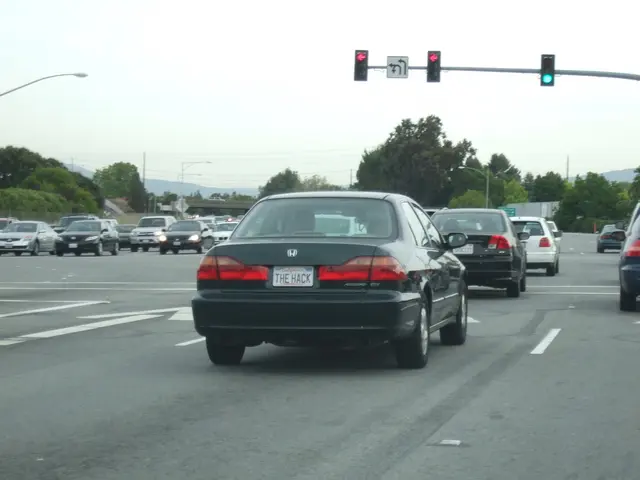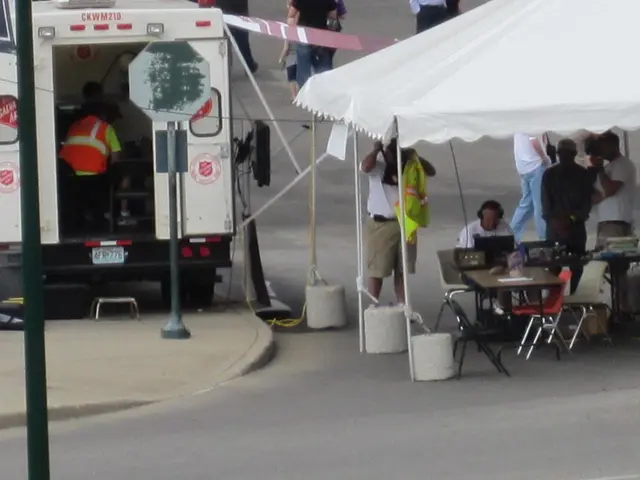Tourists in Trouble: Streaked by Lightning in Czech Republic
Tourists of German Origin Stricken by Lightning in the Czech Republic - Tourists from Germany Incur Dazzling Strikes by Lightning in Czech Republic
Here's the wild tale of two German vacationers who found themselves in a pickle in the Czech Republic. An aged gent and his companion, a woman, were smacked by a bolt of lightning near Tisa, in the Usti nad Labem district.
Local heros, the Czech Mountain Rescue Service, discovered the pair huddled beneath a tree, seemingly attempting to dodge the storm's wrath.
The tourists were jittery and dazed, as per the Mountain Rescue Service's report.
Lightning Rods: Tourists Wounded After Zapping in Czech Republic
"Upon preliminary examination, burns were noticed on the chest regions of both travelers. The telltale signs of a lightning strike were evident, with burn holes in their garments," the Mountain Rescue Service stated. "One man, the older of the two, grumbled about intense facial pain and vision problems in one eye."
The man was shipped off to a trauma center with critical injuries, while the senior woman was transferred to a hospital with modest injuries, claimed a spokesperson for local Czech media. A snapshot published by the Czech Mountain Rescue Service shows: The travelers cheated death by a whisker.
The Czech Hydrometeorological Institute had emitted a severe weather warning for several parts of the country on Saturday, cautioning heavy thunderstorms, torrential downpours, hail, and gusty winds.
Czech Republic Odds and Ends
Though data on lightning strikes specifically impacting tourists during storms in the Czech Republic is sparse, I can shed some light on general statistics.
- Stormy Weather: The Czech Republic experiences lightning strikes frequently, particularly during thunderstorms. Its temperate climate, with summers occasionally turning severe, can prompt occasional tempests.
- Vacay Woes: While lightning strikes can pose dangers to tourists, there's little data available on how frequently tourists succumb to lightning strikes during storms in the Czech Republic. Generally, travelers are encouraged to heed local weather forecasts and warning signs to ensure a safer journey.
- Seasonal Showers: The tourism season in the Czech Republic unfolds during the summer months, overlapping with the time when thunderstorms are more prevalent. Travelers should brace for potential storms and adhere to local safety advice.
Lightning Rods and Security Strategies
- Lightning Detector Devices: Advanced lightning detection systems may not regularly pop up in search results, but devices such as the Ambient Weather WH31L can pinpoint lightning bolts within certain ranges, though this isn't exclusive to the Czech Republic.
- Safety Procedures: When traveling, tourists are suggested to shelter indoors during severe thunderstorms and keep away from open areas where lightning might strike. Local authorities often dispense storm-related advice and updates.
The Bottom Line
Though comprehensive data on lightning strikes striking tourists in the Czech Republic isn't easily accessible, tourists should stay weather-savvy and adhere to safety guidelines during bad weather to minimize risks.
- German vacationers encountered a harrowing experience in the Czech Republic, as they were struck by lightning near Tisa, during heavy thunderstorms.
- According to the Czech Mountain Rescue Service, the elderly man and his companion sustained burns on their chest regions and injuries, with the man complaining of intense facial pain and vision problems.
- The Czech Hydrometeorological Institute had issued a severe weather warning for the country on Saturday, cautioning about heavy thunderstorms, torrential downpours, hail, and gusty winds.
- When traveling in the Czech Republic, tourists are recommended to heed local weather forecasts and warning signs to ensure a safer journey, as data on lightning strikes specifically impacting tourists during storms in the country is limited.
- To stay weather-savvy while traveling, tourists could consider using advanced lightning detection systems like the Ambient Weather WH31L and follow local authority advice for safety during severe thunderstorms.










